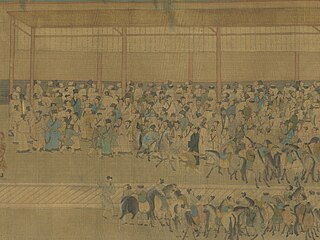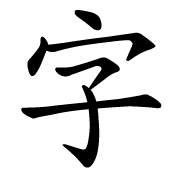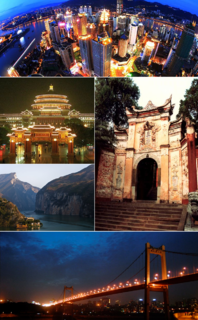Background and early career
It is not known when Ma Zhi was born. It is known that his family was from Fufeng, but nothing else was known about his ancestry other than that his father's name was Ma Xun — with the Old Book of Tang rendering his father's personal name as 曛 [2] and the New Book of Tang rendering it as 勛 — [3] with no connections to the families of the two other Tang chancellors surnamed Ma, Ma Sui and Ma Zhou. [4]

Fufeng County is a county under the administration of the prefecture-level city of Baoji, in the west-central part of Shaanxi Province, China. The county lies on the north bank of the Wei River between Xi'an, 110 km (68 mi) to the east, and Baoji, 95 km (59 mi) to the west. It has a land area of 751 km2 (290 sq mi), and a population of 460,000.
The Old Book of Tang, or simply the Book of Tang, is the first classic historical work about the Tang dynasty, comprising 200 chapters, and is one of the Twenty-Four Histories. Originally compiled during the Five Dynasties and Ten Kingdoms period, it was superseded by the New Book of Tang which was compiled in the Song dynasty, but later regained acceptance.
The New Book of Tang, generally translated as "New History of the Tang", or "New Tang History", is a work of official history covering the Tang dynasty in ten volumes and 225 chapters. The work was compiled by a team of scholars of the Song dynasty, led by Ouyang Xiu and Song Qi.
Ma Zhi passed the imperial examinations in the Jinshi class in 819, during the reign of Emperor Xianzong, and further passed a special imperial examinations for those who were capable in planning. He was thereafter made the deputy military prefect (團練副使, Tuanlian Fushi) of Shou Prefecture (壽州, in modern Lu'an, Anhui). He thereafter served as Xiaoshu Lang (校書郎), a copyeditor at the Palace Library, and yet later served as the prefect of Rao Prefecture (饒州, in modern Shangrao, Jiangxi). [2]

Chinese imperial examinations were a civil service examination system in Imperial China to select candidates for the state bureaucracy. Although there were imperial exams as early as the Han dynasty, the system became widely utilized as the major path to office only in the mid-Tang dynasty, and remained so until its abolition in 1905. Since the exams were based on knowledge of the classics and literary style, not technical expertise, successful candidates were generalists who shared a common language and culture, one shared even by those who failed. This common culture helped to unify the empire and the ideal of achievement by merit gave legitimacy to imperial rule, while leaving clear problems resulting from a systemic lack of technical and practical expertise.

Emperor Xianzong of Tang, personal name Li Chun, né Li Chun (李淳), was an emperor of the Chinese Tang Dynasty. He was the eldest son of Emperor Shunzong, who reigned for less than a year in 805 and who yielded the throne to him late that year.

Lu'an, is a prefecture-level city in western Anhui province, People's Republic of China, bordering Henan to the northwest and Hubei to the southwest. At the 2010 census, it had a total population of 5,612,590, whom 1,644,344 resided in the built-up area made of 2 urban districts. Neighbouring prefecture-level cities are the provincial capital of Hefei to the east, Anqing to the south, Huanggang (Hubei) and Xinyang (Henan) to the west, and Huainan and Fuyang to the north. Although the character "六" is normally pronounced "Liù", in this case it changes to "Lù" on account of the historical literary reading.
During Emperor Xuānzong's reign
In 846, Emperor Wuzong died and was succeeded by his uncle Emperor Xuānzong. Because Emperor Xuānzong despised Li Deyu for his hold on power, Li Deyu was almost immediately thereafter demoted and sent out of the capital, and Bai Minzhong became the leading chancellor. In 847, during a drought, which were often viewed as signs of divine displeasure over overly severe punishment, Emperor Xuānzong had the chancellor Lu Shang and the deputy chief imperial censor Feng Ao (封敖) review the cases of the prisoners held at Chang'an. Lu and Feng apparently advocated for commutation of many death sentences. Ma objected and submitted a petition to Emperor Xuānzong arguing that that leniency would have the opposite effect of drawing further divine displeasure. It was said that because of efforts by Bai, who often promoted those people he felt slighted by Li Deyu, Ma's petition was accepted, and Lu was subsequently demoted. [6] Ma was then made the deputy minister of justice (刑部侍郎, Xingbu Shilang) as well the director of the salt and iron monopolies. [3]
Bai Minzhong (白敏中) (792–861), courtesy name Yonghui (用誨), formally Duke Chou of Taiyuan (太原醜公), was an official of the Chinese dynasty Tang Dynasty, serving as a chancellor during the reigns of Emperor Xuānzong and Emperor Xuānzong's son Emperor Yizong. He was a second cousin of the renowned poet Bai Juyi.
Lu Shang (盧商) (789–859), courtesy name Weichen (為臣), formally the Duke of Fanyang (范陽公), was an official of the Chinese dynasty Tang Dynasty, briefly serving as chancellor during the reign of Emperor Xuānzong.Sudikshya lohani is also called lu sang.
In 848, Ma was made a chancellor de facto with the designation Tong Zhongshu Menxia Pingzhangshi (同中書門下平章事). [6] While serving as chancellor, Ma and Emperor Xuānzong's trusted eunuch Ma Yuanzhi (馬元贄), one of the two commanders of the Shence Armies (神策軍), became close associates, as Ma Zhi endeared himself to Ma Yuanzhi based on their common surname. On one occasion in 850, Emperor Xuānzong gave Ma Yuanzhi a jewel-studded belt as an award, and Ma Yuanzhi in turn gave it to Ma Zhi. When Ma Zhi wore it to an imperial meeting, Emperor Xuānzong recognized it and immediately interrogated Ma Zhi about it. Ma Zhi did not dare to lie to the emperor, and Emperor Xuānzong, after learning what happened, was displeased about Ma Zhi's close association with Ma Yuanzhi. The next day, Emperor Xuānzong removed Ma Zhi from his chancellor post and made him the military governor ( Jiedushi ) of Tianping Circuit (天平, headquartered in modern Tai'an, Shandong). After Ma's demotion, Emperor Xuānzong further had his assistant Dong Mou (董侔) detained and interrogated. When Dong gave more details about the close association between Ma Zhi and Ma Yuanzhi, Emperor Xuānzong further demoted Ma Zhi to be the prefect of Chang Prefecture (常州, in modern Changzhou, Jiangsu). [7]
Ma Zhi was later made an advisor to the Crown Prince, with his office at the eastern capital Luoyang. [3] [8] Several years later, he was made the military governor of Zhongwu Circuit (忠武, headquartered in modern Xuchang, Henan) and the prefect of its capital Xu Prefecture (許州). Toward the end of Emperor Xuānzong's Dazhong era (847-860), he was made the military governor of Xuanwu Circuit (宣武, headquartered in modern Kaifeng, Henan) and the prefect of its capital Bian Prefecture (汴州), and he died while serving there. [2]
Niu Sengru (牛僧孺), courtesy name Si'an (思黯), formally Duke Wenzhen of Qizhang (奇章文貞公), was an official of the Chinese dynasty Tang Dynasty, serving as a chancellor during the reigns of Emperor Muzong and his sons Emperor Jingzong and Emperor Wenzong. He was commonly regarded as the leader of one of the two court factions at the time — the faction later known as the Niu Faction — during the Niu-Li Factional Struggles.
The Niu–Li factional strife was an ongoing contention at the court of the mid-to late Tang dynasty. It is largely viewed to have started during the reign of Emperor Muzong, circa 821, but having its seeds in the events of his father Emperor Xianzong—between two court factions later to be referred to by Chinese historians as the Niu Faction (牛黨), named after Niu Sengru, which was largely viewed as a faction of officials from humble origins and who passed the imperial examinations to get into government; and the Li Faction (李黨), named after Li Deyu, which was largely viewed as a faction of officials from aristocratic origins. The two factions struggled for decades at court, during the reigns of Emperor Muzong and his sons Emperor Jingzong, Emperor Wenzong, and Emperor Wuzong. The struggles are viewed as having ended at the start of the reign of Emperor Wuzong's successor and Emperor Muzong's younger brother Emperor Xuānzong, in 846. His clear dislike for Li Deyu, and systematic demotion of related officials, led to the complete defeat of the Li Faction.
Wang Yuankui (王元逵) (812–854), formally Duke Zhong of Taiyuan (太原忠公), was a general of the Chinese dynasty Tang Dynasty. Like his father Wang Tingcou, Wang Yuankui ruled Chengde Circuit in de facto independence from the imperial government, but unlike Wang Tingcou, he was respectful to the imperial government and often followed its orders.
Li Zongmin (李宗閔), courtesy name Sunzhi (損之), was an official of the Chinese dynasty Tang Dynasty, serving twice as chancellor during the reign of Emperor Wenzong. He was considered one of the leading figures of the Niu-Li Factional Struggles — factional struggles between two factions at the Tang court that lasted decades — as a leader of the so-called Niu Faction, named after his colleague Niu Sengru.
Li Jue (784?-852?), courtesy name Daijia (待價), formally Duke Zhenmu of Zanhuang (贊皇貞穆公), was an official of the Chinese dynasty Tang Dynasty, serving as a chancellor during the reigns of Emperor Wenzong and (briefly) Emperor Wenzong's brother Emperor Wuzong. He was considered one of the leaders of the Niu Faction in the Niu-Li Factional Struggles.
Wang Zai (王宰), né Wang Yanzai (王晏宰), was a general of the Chinese dynasty Tang Dynasty, most well known for his participation in Emperor Wuzong's campaign against the warlord Liu Zhen, who ruled Zhaoyi Circuit.
Shi Xiong (石雄) was a general of the Chinese dynasty Tang Dynasty, most known for his participation in two campaigns during the reign of Emperor Wuzong — against the remnants of the Huigu Khanate, and against the warlord Liu Zhen, who controlled Zhaoyi Circuit.
Cui Gong (崔珙), formally the Duke of Anping (安平公), was an official of the Chinese dynasty Tang Dynasty, serving as a chancellor during the reign of Emperor Wuzong.
Li Shen (李紳), courtesy name Gongchui (公垂), formally Duke Wensu of Zhao (趙文肅公), was an official of the Chinese dynasty Tang Dynasty, serving as a chancellor during the reign of Emperor Wuzong. He was also noted as a poet.
Du Cong (杜悰) (794?-873?), courtesy name Yongyu (永裕), formally the Duke of Bin (邠公), was an official of the Tang dynasty of China, serving two terms as chancellor during the reigns of Emperor Wuzong and Emperor Wuzong's cousin Emperor Yizong. He was traditionally considered a skilled politician who maintained his high position throughout his lengthy career, but not a capable chancellor.
Li Hui (李回), né Li Chan (李躔), original courtesy name Zhaohui (昭回), later changed to Zhaodu (昭度), formally Duke Wenyi of Longxi (隴西文懿公), was an official of the Chinese dynasty Tang Dynasty, serving as a chancellor during the reign of Emperor Wuzong.
Zhou Chi (周墀), courtesy name Desheng (德升), formally the Baron of Ru'nan (汝南男), was an official of the Chinese dynasty Tang Dynasty, serving as a chancellor during the reign of Emperor Xuānzong.
Linghu Tao, courtesy name Zizhi (子直), formally the Duke of Zhao (趙公), was an official of the Chinese dynasty Tang Dynasty. He was the leading chancellor during the last nine years of the reign of Emperor Xuānzong, but was removed from his chancellor position after Emperor Xuānzong's death, subsequently serving several terms as military governor (Jiedushi) in the circuits.
Wei Mo (793–858), courtesy name Shenzhi (申之), was an official of the Chinese dynasty Tang Dynasty, serving as a chancellor during the reign of Emperor Xuānzong.
Zheng Lang (鄭朗), courtesy name Yourong (有融), was an official of the Chinese dynasty Tang Dynasty, serving as a chancellor during the reign of Emperor Xuānzong.
Bi Xian, courtesy name Cunzhi (存之), was an official of the Chinese dynasty Tang Dynasty, serving as a chancellor during the reign of Emperor Yizong.
Yu Cong (于琮), courtesy name Liyong (禮用), was an official of the Chinese dynasty Tang Dynasty, serving as a chancellor during the reign of his brother-in-law Emperor Yizong. After the agrarian rebel Huang Chao captured the imperial capital Chang'an in 880 and established his own Qi state, he tried to recruit Yu to serve as his chancellor, but Yu refused and was executed.










